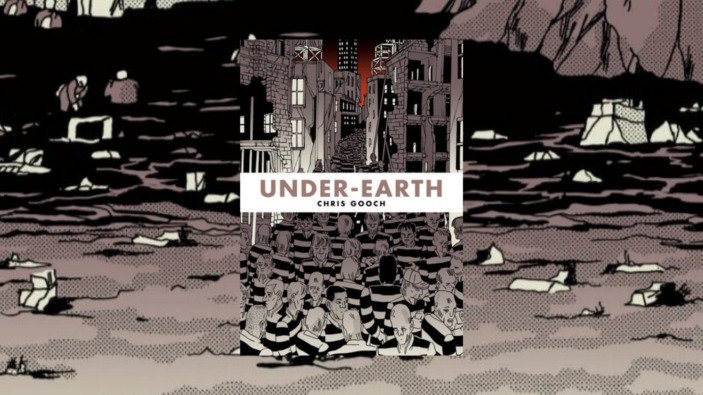
Cartoonist Chris Gooch manages to pack a lot into this page-turning dystopian graphic novel. Under-Earth follows two sets of prisoners as they struggle to survive in the subterranean landfill prison of Delforge. Gooch’s story is a commentary on everything from capitalism, materialism, and prison culture to revenge, forgiveness, loneliness, and friendship.
The story begins with new inmate Reece Dixon being pushed out of a helicopter to fall into the outskirts of the underground prison city. Reece, who is relatively non-violent and a bit of a pushover, struggles to survive in the harsh conditions until he meets Malcolm, a more experienced inmate who takes pity on him and teaches him the ropes. Meanwhile, desperate thieves Ele and Zoe, are in hiding after their employer tricks and betrays them.
Ultimately, this character-driven story is about friendship and its role in survival. Reece’s friendship with Malcolm is tenuous with both characters wary and more dedicated to their own survival than each other. As a result, they both struggle with the harsh realities of their life underground.
Meanwhile, Ele and Zoe’s relationship is solid and their trust in one another is complete. But, Ele’s focus on the things she misses from before clouds her ability to treasure what she has now. Her bedroom is a monument to the past, filled with relics of the outside world, and her focus on escape leaves her unable to see the deep and abiding love Zoe has for her.
Gooch’s world is bleak, mirrored perfectly in the grim monotone pallet. Even the bright yellow highlights of Zoe and Ele’s chapters feel almost like a tease, a way to torment the reader the way Delforge’s only star torments the inmates. A false hope. The only other colour to appear throughout is the bright red of blood.
Large sweeping panels give readers an overview of the setting with the desolate and cramped nature of the prison and its inhabitants quickly established in the opening chapters. I did, however, find the male characters were not always easily distinguishable, particularly in the beginning. With all the characters wearing the same jumpsuit, it’s often down to a particular hairstyle to identify the characters. However, I wonder if this is a deliberate decision on Gooch’s part—a subtle way of signaling how society treats prisoners, balling them all up into a single identity with no individuality.
There is a question raised by this story about prisons and their function. The underlying premise of Delforge is that no one can be trusted. As Malcolm tells Reece, “It’s easier down here if you don’t have to care about anyone else”. The system is built not only to isolate the inmates from the outside world but from each other as well. It encourages them to think only of themselves and their own survival. Which begs the question, what is the prison’s purpose?
Although it’s never specifically stated, it’s heavily implied that the people who enter Delforge never come back out. So, if it’s not there to reform them, is it there to punish them? Is it there to separate the good from the bad? What is the purpose in locking someone up forever and what are the ethics of such an act?
As public opinion often sways towards harsher penalties for criminals, these are important questions to raise and as he does so, Gooch reminds us that these prisoners are still people in need of love and friendship.
![]()
![]()
![]()
![]()
![]()
THREE STARS (OUT OF FIVE)
Chris Gooch’s Under-Earth is out now from Top Shelf Productions. Order your copy from Booktopia HERE.
